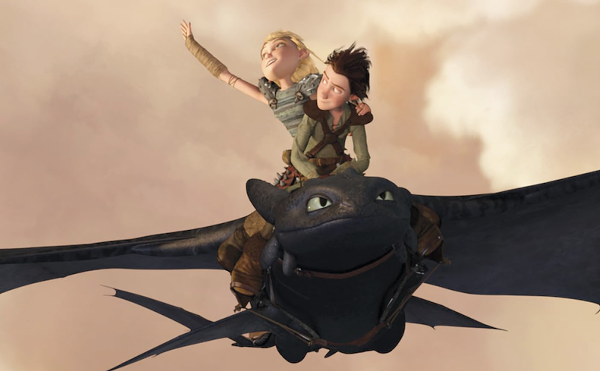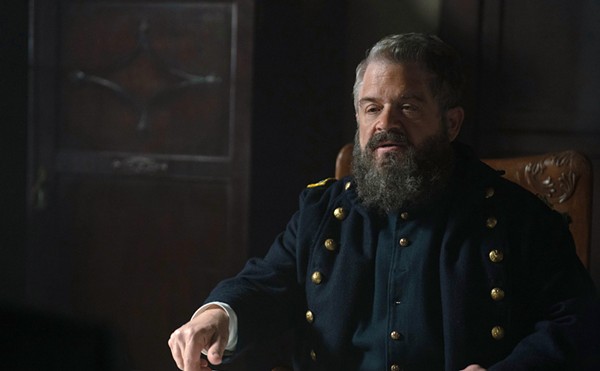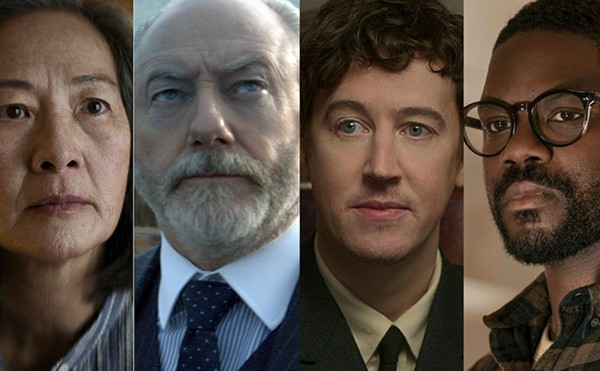'STORYTELLING' "Pulls no punches" Dir. and writ. Todd Solondz; feat. Selma Blair, Leo Fitzpatrick, Robert Wisdom, John Goodman, Julie Hagerty, Paul Giamatti, Mark Webber (R) In his own oft-repeated words (see "Talking About 'Storytelling'" interview in Screens), director Todd Solondz' films are "not for everyone." It's his habit to put the viewer in the most uncomfortable situations possible, and then refuse to invent a neat moral resolution. (Many, when faced with such discomfort, laugh nervously; the movies, then, are comedies.) Some critics see this behavior as evidence of misanthropy - hatred of his audience, his characters, himself.
But there are moral motivations behind the filmmaker's work, even if some see them as high-handed or masochistic. Solondz intends to force us to identify - even in a limited, off-and-on way - with characters who do some very wrong things; unlike the mob film that lets us enjoy a criminal lifestyle vicariously, the identification here is not one of enjoying someone else's misdeeds, but of seeing the humanity within someone whose trespasses are entirely unappealing. (In Happiness, one of the most sympathetic characters is a child molester - the fact that we suffer with him doesn't mean Solondz isn't totally opposed to his behavior.)
In this film, Solondz combines his previous tactics with a thoughtful, unmerciful examination of his own profession, the creation of narrative. Two separate stories, called "Fiction" and "Nonfiction," tackle the supposedly black-and-white distinction between the kinds of tales we tell, and find that their names should often be reversed:
1) A class of aspiring collegiate authors - mostly white girls - struggles to create art out of their bland suburban lives. Their seminar is led by an imposing black man who responds to their prurient curiosity by exploiting them before they can do the same to him. When one student turns a deeply unpleasant encounter with him into a story, her classmates treat it as contrived fiction, refusing to come to the obvious conclusion that every word is true.
2) A pathetic would-be documentarian sets out to capture high school pathos on film. He finds a truly vapid subject, and proceeds to make the least objective, most exploitative film possible. Though he shoots from life, his document fails to capture much even-handed truth.
In both of these stories, the authors are attacked with the very criticisms that have hounded Solondz: misanthropy, exploitation, bitterness, meanness. In both cases, the accusations are shown to have at least some merit. But the director is shedding light on the incredibly complicated ethical dilemmas involved in telling tales, and any viewer who agrees completely with one of the film's onscreen critics is missing the point. Putting another life - even a "fictional" one - into words or images is one of the most important things humans do, and Solondz proves he's looking at his own behavior with the same scrutiny he directs toward his creations. 'QUEEN OF THE DAMNED' "Should I say it? Sucks" Dir. Michael Rymer; writ. Anne Rice (novels), Scott Abbott; feat. Stuart Townsend, Marguerite Moreau, Aaliyah, Vincent Perez, Paul McGann, Lena Olin (R) All right, imagine you're a vampire. Born a few centuries ago in France, you heard Beethoven the first time around; you haunted New Orleans when Louis Armstrong rocked the joint. In a fit of angst, you retreated beneath the earth for a decades-long nap. After the stuff you've seen, what new offering from the mortal world could wake you? If your answer was "crappy goth metal," this may be the movie for you. But probably not. Anne Rice fans must be spinning in their coffin-shaped beds at this butchered and bland version of two novels in her "Vampire Chronicles." Sucking all the atmosphere and literary ambition out of Rice's work, director Rymer has problems with the simplest dramatic set-ups. Why does our intrepid investigator of the paranormal, Jesse Reeves, flirt with death, you ask? Cuz she's fascinated by vampires, or she wants to become one of them? If Rymer knows, he's not sharing. Though the marketing machine makes it look as though this film is all about the recently-departed pop star Aaliyah, the singer's character doesn't appear until quite late in the film. When she does, she's more movie monster than person - she writhes like the snakes atop Medusa's head and speaks with a multi-tracked "big scary person" voice. Her (very cool) costumes show a lot of skin, and she's a pretty fierce sexual presence, but that's about it. If I were her family, I'd flinch at the "Dedicated to Aaliyah" that appears as the credits start to roll. The tale is really about Lestat, though, and Townsend gives a performance that is right in line with the movie's halfway-campy-but-not-quite-there tone. His accent is a muddle (as is that of his "maker" Marius) and he makes his every act seem like a pre-schooler's cry for attention. No wonder the whole of vampdom arrives to shut him up. Too bad they couldn't silence the movie itself.
But there are moral motivations behind the filmmaker's work, even if some see them as high-handed or masochistic. Solondz intends to force us to identify - even in a limited, off-and-on way - with characters who do some very wrong things; unlike the mob film that lets us enjoy a criminal lifestyle vicariously, the identification here is not one of enjoying someone else's misdeeds, but of seeing the humanity within someone whose trespasses are entirely unappealing. (In Happiness, one of the most sympathetic characters is a child molester - the fact that we suffer with him doesn't mean Solondz isn't totally opposed to his behavior.)
In this film, Solondz combines his previous tactics with a thoughtful, unmerciful examination of his own profession, the creation of narrative. Two separate stories, called "Fiction" and "Nonfiction," tackle the supposedly black-and-white distinction between the kinds of tales we tell, and find that their names should often be reversed:
1) A class of aspiring collegiate authors - mostly white girls - struggles to create art out of their bland suburban lives. Their seminar is led by an imposing black man who responds to their prurient curiosity by exploiting them before they can do the same to him. When one student turns a deeply unpleasant encounter with him into a story, her classmates treat it as contrived fiction, refusing to come to the obvious conclusion that every word is true.
2) A pathetic would-be documentarian sets out to capture high school pathos on film. He finds a truly vapid subject, and proceeds to make the least objective, most exploitative film possible. Though he shoots from life, his document fails to capture much even-handed truth.
In both of these stories, the authors are attacked with the very criticisms that have hounded Solondz: misanthropy, exploitation, bitterness, meanness. In both cases, the accusations are shown to have at least some merit. But the director is shedding light on the incredibly complicated ethical dilemmas involved in telling tales, and any viewer who agrees completely with one of the film's onscreen critics is missing the point. Putting another life - even a "fictional" one - into words or images is one of the most important things humans do, and Solondz proves he's looking at his own behavior with the same scrutiny he directs toward his creations. 'QUEEN OF THE DAMNED' "Should I say it? Sucks" Dir. Michael Rymer; writ. Anne Rice (novels), Scott Abbott; feat. Stuart Townsend, Marguerite Moreau, Aaliyah, Vincent Perez, Paul McGann, Lena Olin (R) All right, imagine you're a vampire. Born a few centuries ago in France, you heard Beethoven the first time around; you haunted New Orleans when Louis Armstrong rocked the joint. In a fit of angst, you retreated beneath the earth for a decades-long nap. After the stuff you've seen, what new offering from the mortal world could wake you? If your answer was "crappy goth metal," this may be the movie for you. But probably not. Anne Rice fans must be spinning in their coffin-shaped beds at this butchered and bland version of two novels in her "Vampire Chronicles." Sucking all the atmosphere and literary ambition out of Rice's work, director Rymer has problems with the simplest dramatic set-ups. Why does our intrepid investigator of the paranormal, Jesse Reeves, flirt with death, you ask? Cuz she's fascinated by vampires, or she wants to become one of them? If Rymer knows, he's not sharing. Though the marketing machine makes it look as though this film is all about the recently-departed pop star Aaliyah, the singer's character doesn't appear until quite late in the film. When she does, she's more movie monster than person - she writhes like the snakes atop Medusa's head and speaks with a multi-tracked "big scary person" voice. Her (very cool) costumes show a lot of skin, and she's a pretty fierce sexual presence, but that's about it. If I were her family, I'd flinch at the "Dedicated to Aaliyah" that appears as the credits start to roll. The tale is really about Lestat, though, and Townsend gives a performance that is right in line with the movie's halfway-campy-but-not-quite-there tone. His accent is a muddle (as is that of his "maker" Marius) and he makes his every act seem like a pre-schooler's cry for attention. No wonder the whole of vampdom arrives to shut him up. Too bad they couldn't silence the movie itself.
Tags:

KEEP SA CURRENT!
Since 1986, the SA Current has served as the free, independent voice of San Antonio, and we want to keep it that way.
Becoming an SA Current Supporter for as little as $5 a month allows us to continue offering readers access to our coverage of local news, food, nightlife, events, and culture with no paywalls.
Scroll to read more Movie Reviews & News articles
Newsletters
Join SA Current Newsletters
Subscribe now to get the latest news delivered right to your inbox.














